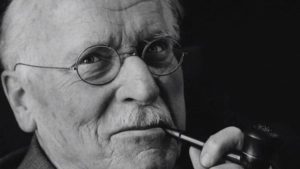Death, That Unproblematic End Of Individual Existence
“I have often been asked what I believe about death, that unproblematic end of individual existence.Death is simply known to us as the end.It is the dot, often placed before the end of the sentence and followed only by memories of aftereffects in others.For the person concerned, however, the sand has run out of the glass; the rolling stone has come to rest.When death confronts us, life always seems like a downward flow or like a clock that is excited and whose eventual “walking” is taken for granted.We are never more convinced of this “ending” than when a human life comes to an end before our eyes, and the question of the meaning and value of life never becomes more urgent or painful than when we take the last breath of a body that lived a moment earlier.
How different the meaning of life seems to us when we see a young person striving for distant goals and shaping the future, and comparing this to an incurable invalid, or to an old man who reluctantly sinks and has no strength to resist in the grave!Youth – we would like to think – has a purpose, future, meaning and value, while coming to an end is only a meaningless end.
If a young man is afraid of the world, of life and the future, then everyone thinks that is unfortunate, pointless, neurotic; he is considered a cowardly shirker.But when an aging person secretly shudders and is even terrified at the thought that his reasonable life expectancy is now only a limited number of years, we are painfully reminded of certain feelings in our own chest; we look away and focus the conversation on a different topic.
The optimism with which we judge the young man falls short of us here.Of course, for every eventuality, we have one or two appropriate banalities about life that we occasionally communicate to the other guy, such as “everyone must die once,” “one does not live forever,” etc. But if someone is alone and it is night and so dark and quiet that you hear nothing and then see the thoughts that add up and subtract the years, and the long line of unpleasant facts that relentlessly indicate how far the hand of the clock has gone, and the slow irresistible approach of the wall of darkness that will eventually engulf everything you love, possess, wish, strive and hope – then all our profundities about life sneak away to an undiscovered hiding place, and fear envelops the sleepless like a suffocating blanket.”
Source: Fragment of Carl C.G. Jung – The Soul and Death (in: The Meaning of Death, Herman Feifel, editor)
How Jung Suggests We Look To Death
“First, as noted above, Jung admits that death is a mystery, something we cannot fully understand, describe, explain, or propose.Death raises a question that we cannot answer.But despite all the frustration that comes with that, we have to try to deal with it.Why?Jung replies, “If you haven’t done that, that’s an essential loss.Because the question … is the ancient heritage of humanity: an archetype, rich in secret life, who tries to add himself to our own individual life in order to make it whole.”
Death is an archetype, one of the experiences we all have, such as birth, growing, creating, aging.As an archetype, it has an intention, that is, it wants something from us.It tries to generate behavior.Such as Reflection, introspection, an inner turn, care for our soul, appreciation for psychic things, such as dreams and intuitions, and a deepening of our love for mystery.Death asks us to integrate more of reality within ourselves, including that aspect of ourselves that exists outside of space and time.In this way, it strives to enrich individual life and make it more whole.
Death also pushes us to become more self-aware, to create more consciousness.Death wants us to use it as an incentive to develop more of our potential.Jung experienced this during his near-death experience, when he saw what he had been and what he had lived, and it was all a fait accompli.And he had no regrets.
As the essay on the concept of enantiodromy noted, Jung emphasized the need to hold the tension of opposites.Opposites can be found everywhere, both in consciousness and in the unconscious.So if we have life, we must also have the opposite, death.One of the criticisms Jung would have of our contemporary American culture is the one-sidedness about these two contradictions, with our almost complete focus on life and the denial of death.We need to develop a culture that can see death as half the experience of the soul, as much a part of life as physical existence.
In undertaking this cultural evolution, we do not need to reinvent the wheel.We can draw on the millennia-long experience of focusing on the soul that took place during the Middle Ages (ca. 500-1500 CE), when society was more attuned to elusive than to the world of matter.Much attention was paid to taking care of the soul and as part of this process a whole series of literature was created describing how to prepare for death.”
Source: “How Jung Suggests We View Death, published by ‘ Jungian Center for the Spiritual Sciences, full article : http://jungiancenter.org/“
Enantiodromy : (Greek: enantios, opposite, and dromos, walking direction) is the name for the principle discovered and introduced by Jung, that a strong one-sided conception in consciousness inevitably evokes its opposite in the unconscious and thereby produces points of view that are rejected in consciousness.
And the entire interview with Carl Gustav Jung by John Freeman, of which the part about death is a part.

